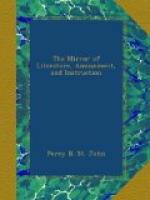[1] Tait’s Edinburgh Magazine for the present month.
[2] At this school also were educated Vice-Admiral Lord Collingwood; Sir Robert Chambers; William Elstob, an antiquary and divine; the poet, Akenside; the Rev. George Hall, Bishop of Dromore; and the Rev. John Brand, author of a history of Newcastle, and secretary to the Society of Antiquaries; all of whom were born at Newcastle.
In 1783; Mr. Scott obtained a silk gown; and, through Lord Weymouth’s interest, he was introduced into parliament for the borough of Weobly. It is stated that on the latter occasion, he stipulated for the liberty of voting as he pleased. He took a decided part with the Pitt administration; and in 1788, he was appointed solicitor-general, and knighted; in 1793, he rose to be attorney-general, and in the following year he conducted the trial of Hardy, Tooke, and Thelwall, for treason. Erskine was opposed to him; and the prosecution failed, though the speech of the attorney-general occupied nine hours in the delivery.
In 1799, Sir John Scott was appointed to the chief justiceship of the Common Pleas, on the resignation of Chief Justice Eyre; and in the same year he was raised to the peerage by the title of Baron Eldon. In 1801, he was made Lord Chancellor, which high office he retained till the year 1827, with the exception of the short period during which the Whigs were in office, in 1806. His lordship was raised to the dignity of an earl at the coronation of George IV. in 1821.




